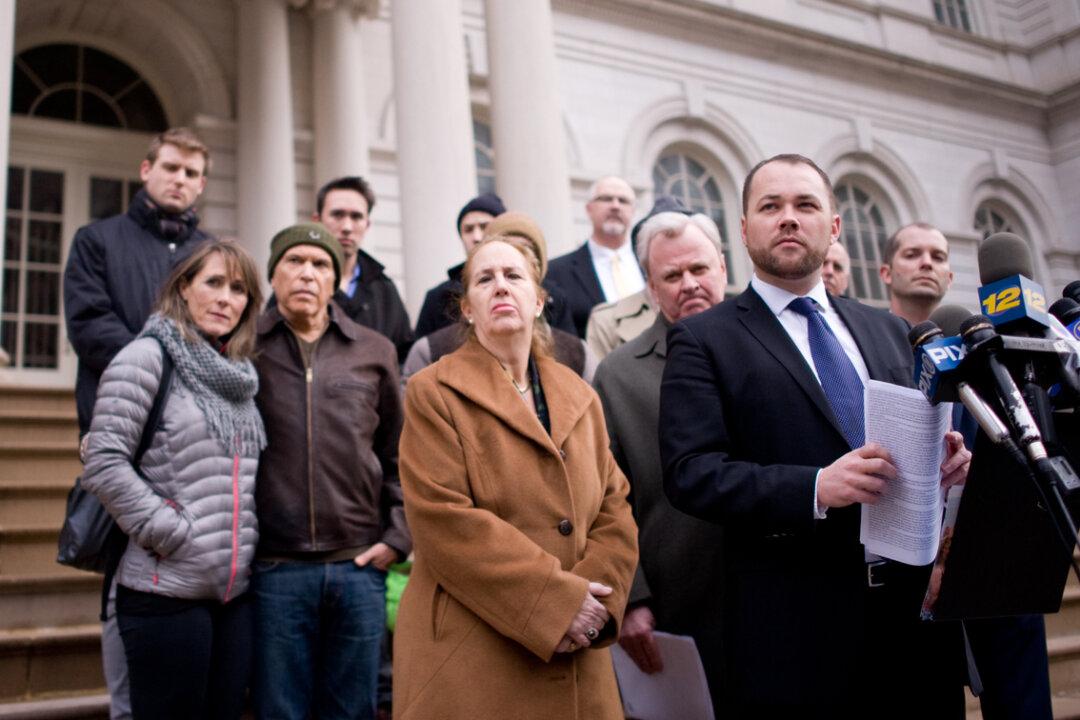NEW YORK—Like a phoenix is born from the ashes, so can better safety regulations be born from building fires. On Monday, Council member Corey Johnson announced proposed legislation that would require the city’s residential high-rises of six stories or more to have emergency communication systems installed in stairways and possibly hallways as well.
The legislation came about as the result of a Jan. 5 apartment fire on the 20th floor of The Strand, a high-rise on the far west side of Midtown. A faulty extension cord caught fire at about 11 a.m., sending smoke into the apartments above. Two men panicked and ran into a stairwell that was full of smoke. They were found later on the 31st floor and rushed to the hospital. One was severely injured but is in stable condition, the other died that day.
“Daniel’s life could have been saved if he had stayed in his apartment but he wasn’t given proper instructions when the fire broke out,” said Johnson, who serves the district where the fire broke out.
Daniel McClung, 27, a playwright by profession, died from the smoke that was shooting up the stairwell. The Fire Department said he would have survived if he had known to stay in his apartment, which was fireproof.
The Fire Department’s “Residential Apartment Building Fire Safety Guidelines” state that for buildings that are fireproof, it is best to stay inside unless the fire is in the unit itself. It says to seal all holes that smoke can seep into and call the fire department as soon as possible. For nonfireproof buildings, it says to evacuate immediately.
The bill, which Johnson said should be finalized in the next month, has a tentative implementation date of July 1, 2019. That is the same date that owners of buildings of 100 feet or taller will be required to install sprinkler systems as well.
Emergency communication systems are already required in commercial buildings, like offices and hotels, but not in residential buildings. Johnson said he had not done a cost analysis, but thinks the infrastructure would be relatively easy to install.
“I don’t think that the cost is going to be that prohibitive to make sure that New Yorkers are safe in their own apartment buildings,” said Johnson, who acknowledged that landlords would be the ones paying for it.
Thomas Von Essen, a former Fire Department commissioner said, “If older buildings are able to add wiring for the Internet and cable TV, it doesn’t seem unreasonable to require a public address speaker system in the stairwell that might save lives.”
In addition Johnson called for better communication before the fire happens.
“I think that fire drills should be part of it. I think that we need to make sure that residents annually are updated through a flier or through some type of communication to let them know the best way to evacuate in case of a fire.”
Manhattan Borough President Gale Brewer suggested social media as one way to reach people.
“We need to use social media, even though it is not a law to do so, to tell people what kind of building they live in and what the fire situation is, God forbid there should be an emergency.”
Emergency evacuation plans for residential buildings can be found online or upon request from building managers or landlords, Johnson said. They are also required by law to be posted in a conspicuous place in the building.
There is nothing in the bill’s draft that would require buildings to have alternative communication systems for the deaf or hard of hearing, but Johnson said he is open to modifying the legislation once he talks to the fire department
The Fire Department did not respond for comment.
Holly Kellum is a special correspondent in New York.





